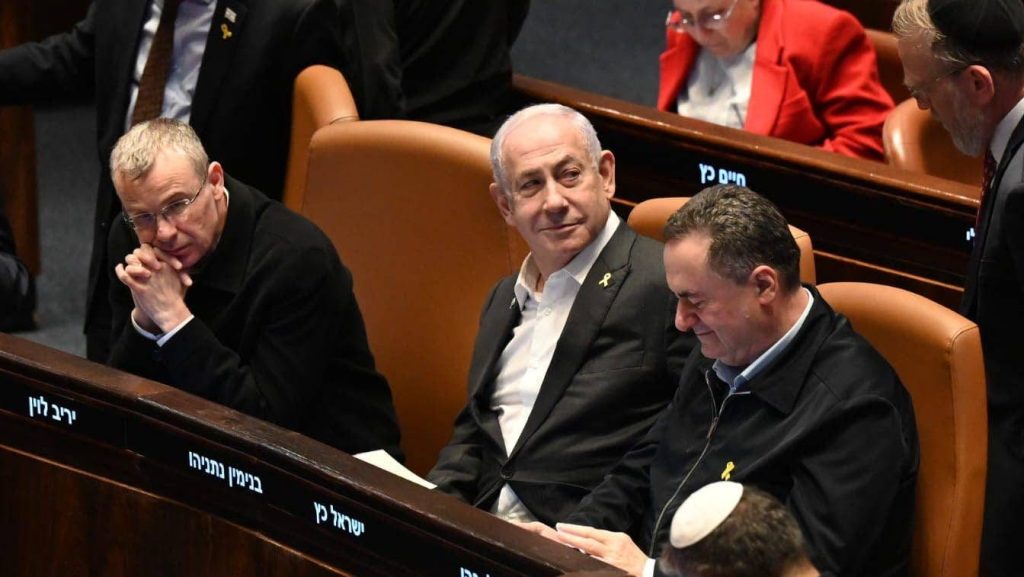Israeli Prime Minister Benjamin Netanyahu, despite undergoing prostate surgery just two days prior, made a significant appearance at the Knesset, the Israeli parliament, for a crucial vote on the “Trapped Profits Law.” This bill, aimed at taxing retained corporate earnings previously exempt to encourage investment, became a critical point of contention within the governing coalition. Netanyahu, accompanied by his physician, appeared in good spirits despite the recent procedure, highlighting the urgency and importance of the vote. The potential failure of this bill carries the weight of triggering a governmental collapse and snap elections if not passed by the March 31st deadline.
The political maneuvering surrounding the Trapped Profits Law revealed internal tensions within Netanyahu’s coalition government. Two key coalition partners, United Torah Judaism (UTJ) and Otzma Yehudit, threatened to withhold their support, leveraging the vote to advance their respective agendas. UTJ, representing the Haredi Orthodox Jewish community, demanded progress on legislation exempting their constituents from military service, a long-standing and contentious issue in Israeli society. Otzma Yehudit, led by National Security Minister Itamar Ben-Gvir, sought increased budgetary allocations for law enforcement and emergency services, including the police, prison service, and firefighting agencies. These demands placed Netanyahu in a precarious position, requiring him to navigate the conflicting interests within his coalition while simultaneously ensuring the survival of his government.
The controversy surrounding the Haredi draft exemption further complicated the political landscape. The Israeli High Court of Justice had previously ruled such exemptions illegal, prompting the Israel Defense Forces (IDF) to initiate plans for drafting yeshiva students. This sparked heated public debate and intensified the UTJ’s resolve to secure legislative protection for their community. The confluence of these factors—the budget vote, the Trapped Profits Law, and the Haredi draft exemption—created a volatile political environment, underscoring the fragility of Netanyahu’s coalition and the high stakes of the impending vote.
Netanyahu’s recent health challenges added another layer of complexity to the unfolding political drama. His prostate surgery, necessitated by a urinary tract infection resulting from a benign prostate enlargement, followed a series of health procedures over the past two years, including hernia surgery, hospitalization for dehydration, and the implantation of a pacemaker. These health concerns, coupled with his ongoing testimony in a corruption case and the demands of leading the IDF in a volatile regional context, placed immense pressure on the 75-year-old prime minister. His determination to attend the Knesset vote despite his recent surgery underscored the crucial nature of the situation.
Beyond the internal political dynamics, Netanyahu faced significant security challenges in the Middle East, particularly concerning Iran and its proxies. The IDF recently launched strikes against Houthi rebels in Yemen, targeting their infrastructure and disrupting their operations. These actions, coordinated with US Central Command (CENTCOM), aimed to counter the Houthi threat to regional stability and maritime security. Netanyahu’s leadership in these military operations further highlighted the multiple fronts on which he was engaged, navigating both domestic political pressures and international security concerns.
The convergence of these events—the crucial budget vote, the demands of coalition partners, the Haredi draft exemption controversy, Netanyahu’s health challenges, and the ongoing military operations in the Middle East—created a complex and dynamic situation with significant implications for Israel’s political future and regional security. The outcome of the Trapped Profits Law vote held the potential to reshape the political landscape, either solidifying Netanyahu’s government or triggering a period of instability and new elections. The prime minister’s ability to navigate these challenges would be a crucial test of his political acumen and leadership.

